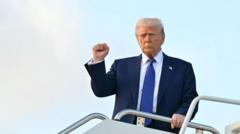The year 2025 seems poised to be a significant turning point in global affairs, reminiscent of tumultuous times like 1968 and 1989. This new epoch could herald profound shifts as the traditional geopolitical frameworks fray, with President Donald Trump's assertive America First doctrine fundamentally altering established norms.
For decades, U.S. presidents have adhered to a diplomatic strategy focused on collective security in Europe and balancing power in Asia against the influence of Russia and China. Trump's approach, however, has been characterized by a single-minded focus on U.S. interests, often disregarding the implications of this stance for international alliances. His emphasis is heavily weighted towards cost assessments, which has disarmed traditional allies and left many uneasy.
This departure from long-standing diplomacy has left fellow world leaders grappling with a new reality. Trump's decision-making style, marked by personal whims and a desire for adoration, has led to an administration where dissent is often discouraged, and his staunch supporters feel the pressure to align with his controversial views. Critics note that this environment stifles balanced decision-making and could exacerbate tensions globally.
The ongoing conflict in Ukraine is emblematic of the shifting dynamics, with Trump advocating peace negotiations that seem increasingly favorable to Russia. As Russian forces inch forward, the potential for a negotiated settlement that sidesteps Ukrainian interests grows, raising alarms in European capitals. Observers warn that the Kremlin may see Trump's proposals as advantageous, especially given his cavalier dismissal of Russian isolation and leverage.
Furthermore, the internal political landscape in the U.S. may play a role in shaping Trump's foreign policy, particularly with midterm elections looming in late 2026. Growing inflation and discontent with his leadership could impact the Republican grip on power and affect the trajectory of his policies. If Congress changes hands, Trump's ability to unilaterally dictate foreign policy could diminish.
As the specter of a Chinese ascendancy looms and the geopolitical weight of the European Union appears to be waning, the stakes could not be higher. Experts caution that if traditional U.S. deterrents falter, the consequences could be far-reaching, potentially empowering aggressive states like Russia to renegotiate the global order to their advantage.
The implications of these developments for international diplomacy are profound; if Trump's legacy is one of goodwill extended to autocratic regimes, 2025 may indeed be marked as a pivotal year where the trajectory of global conflicts and alliances were irrevocably altered. As the world watches and waits, the question remains: Can the international community adapt to these changes, or will it succumb to the disruptive forces at play?




















